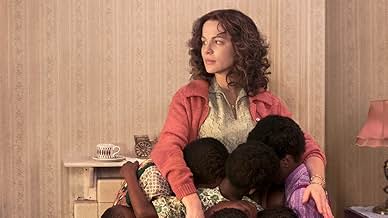IMDb RATING
6.2/10
2.5K
YOUR RATING
Based on the writer/director's childhood, FARMING tells story of a young Nigerian boy, 'farmed out' by his parents to a white British family in the hope of a better future. Instead, he joins... Read allBased on the writer/director's childhood, FARMING tells story of a young Nigerian boy, 'farmed out' by his parents to a white British family in the hope of a better future. Instead, he joins a white skinhead gang.Based on the writer/director's childhood, FARMING tells story of a young Nigerian boy, 'farmed out' by his parents to a white British family in the hope of a better future. Instead, he joins a white skinhead gang.
- Director
- Writer
- Stars
- Awards
- 3 wins & 3 nominations total
- Director
- Writer
- All cast & crew
- Production, box office & more at IMDbPro
Featured reviews
In the early 1990s while dinning in an African restaurant in Los Angeles, I bumped into Adewale - he'd heard my English accent as I spoke with my West African wife and struck up a conversation. We exchanged numbers and agreed to meet up again having mentioned our mutual interest in the movie industry. He was just breaking into Hollywood and I fancied myself a screenwriter.
Adewale shared the phenomenon of 'farming the children,' recounting his own experiences under that abdication of parental responsibility. Since we're both Londoners of similar age we shared stories of our youth in the late seventies. I spent that period of my life deeply immersed in the British punk rock scene, itself a hub for the skinhead and mod revivals. I have no recollection of Adewale mentioning his peculiar involvement in a gang of ultra-violent white racist skinheads during this era; perhaps shame dictated he avoid speaking of such an astonishing episode in his life.What I do know is that his movie's portrayal of nineteen-seventies white working-class English people and of the subcultures of their children is absurdly cartoonish and trite.
The neo-Nazi, psycho-skin trope has been a reliable contemporary Hammer Horror-like monster which 'Farmed' disappointingly enjoins. It's unfortunate since this era's youth is redolent with story lines worth telling - and worth telling accurately. The working-class English who lived during that time are a kaleidoscope of characters and attitudes worthy of honest examination as are their interactions with immigrants and their English-born children. To portray them as generally bigoted, oafish, humourless and hyper-aggressive is to indulge a stereotype no less insulting than the black pimp or the inscrutable Asian.
Nigerian farmed children have unique and lamentable stories, but for me this film failed to capture the emotional complexity and profundity of the arrangement due to heavy-handed poetic license of the writer/director.
Wally Badger, aka Adewale Akinnuoye-Agbaje, is misleading his intended audience with a view to making a profit. Unbeknown to him, because he failed to do proper research, the Skinhead gang he claims to of belonged to, have been written about many times online and in print. The BBC even recorded a documentary detailing some of their activities. The evidence that suggests his story is pure fantasy, will be damaging to him to say the least.
For what this is, the film deserves a top score. This is a very subjective opinion from a fellow farmee - it is astonishing there is still so little information available on the project between the 1960 - 1990 & how specifically Nigerians were affected. I'm sure there are plenty that would like to know more about their experiences but will struggle to find much. The film paints a perfect picture of the time & articulates the challenge of identity with aplomb.
Movies make an impact on the industry and society as a whole because of how they make the audience feel long after the credits roll. The filmmakers take into consideration the totality of the viewer's experience (sights, sounds, emotions, mind). After watching this movie, I felt extremely disturbed with more questions than answers. The audience comes into the movie heavily invested in the story of Enitan and we go through all the heartbreak and humiliation that he experiences. But we don't get to experience the emotional reward of seeing his rehabilitation and moment of self-actualization. It's just presented to us in text towards the end with no explanation of how Ms. Dapo and the others reformed him or what made him come to grips with his identity. This is a serious flaw.
A story that needed to be told - moving!
A good interpretaion of a troubled UK - in troubled times - Good performance by Beckinsale - stole the show
Did you know
- TriviaShortly after the release of this film, the online blog 'Creases Like Knives' published an article and review of the film, heavily implying that writer/director Adewale Akinnuoye-Agbaje had fictionalized a great deal of what was supposed to be 'his' story. The 'Tilbury Skins' gang portrayed in this film were inaccurately depicted, and anybody from Akinnuoye-Agbaje's past has yet to come forward and confirm that he was in fact a member of the white skinhead gang (let alone being their leader). On the contrary, a few people who attended high school with Akinnuoye-Agbaje describe him as belonging more to the 'mod' crowd, who never associated with such gangs.
- GoofsMs. Dapo's phone number is eleven digits long and begins with 013. In the 1980s UK phone numbers were ten digits long and the only ones which began with 01 were London's which had the dialing code 010.
- How long is Farming?Powered by Alexa
Details
- Release date
- Countries of origin
- Official site
- Language
- Also known as
- Воспитание
- Filming locations
- Gillingham, Kent, England, UK(jewellery shop)
- Production companies
- See more company credits at IMDbPro
Box office
- Gross worldwide
- $89,374
- Runtime1 hour 41 minutes
- Color
- Aspect ratio
- 2.35 : 1
Contribute to this page
Suggest an edit or add missing content
































